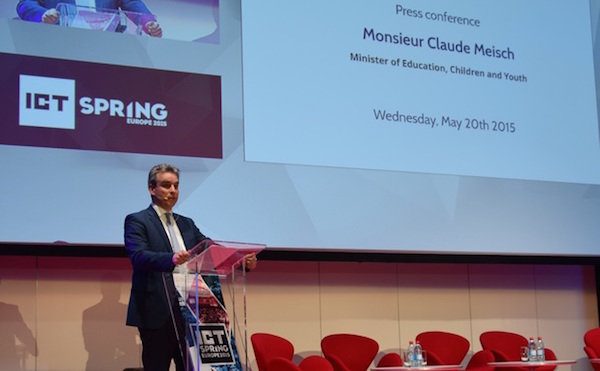
Luxembourg’s Minister of National Education, Childhood and Youth, Claude Meisch, was on hand at the second and final day of the ICT Spring Conference, Wednesday, to present the Digital (4) Education strategy, for developing the necessary skills of the twenty-first century.
The strategy’s name carries a double meaning, which perfectly illustrates its two main priorities and objectives:
- Digital Education: preparing young people for a complex and ever-changing working environment, and in their role as citizens in the public and private sector.
- Digital for Education: promoting new learning strategies and innovative educational projects, using digital in schools
The strategy also reflects the Ministry’s efforts to train future specialists in the ICT sector and promote entrepreneurship within it. It also aims to reduce the digital divide, granting all young people, independent of their social background, access to quality educational resources.
At its core, Digital (4) Education can be broken down into several dimensions. Minister Meisch presented the flagship projects, which are a part of the strategy.
- BEE SECURE: a programme aiming to promote safer use of ICT, through coherent information and advice to citizens.
-EduSphere: a portal for educators, to support teaching and learning
- MathemaTIC: a digital mathematics learning tool for Cycle 4 of primary education
- Digital Classroom Lëtzebuerg (DCL): a technical and technological skills development programme in two strands:
- The introduction of “Office 365 for Education”, which will enable 12,000 primary and secondary school teachers, 45,000 secondary school students, and 5,000 administrative officials to have free access to a modern production and collaboration digital environment
- Innovative Schools – a project using digital tablets in classrooms and promoting new learning strategies that allow:
- BEE CREATIVE: a programme, which aims at improving the digital skills (programming, security, design, communication) of young Luxembourg residents and contributes to the development of a digital culture in the Grand-Duchy. Within this framework, creative hotspots called “Maker-Space” will be established, where young people can put their digital tools to good use.
- The future Lycée de Clervaux, which will open for the 2018/19 academic year, and will prioritise the development of digital skills
Photo by Ministry of National Education Childhood and Youth








